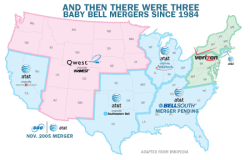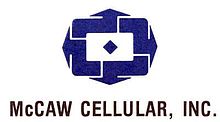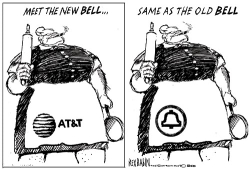
Since the 1984 Bell break-up, AT&T has been recreating itself, like the brooms of the Sorcerer’s Apprentice sequence in Fantasia. What were originally 7 regional Bell companies merged into 2 regional Bells, then those two bought the long-distance operators with big market share in the Internet core. AT&T is descended from Southwestern Bell, one of the original 7, and changed names when it bought the long-distance operation.
AT&T has spent most of its corporate life grifting off government. It won huge subsidies to create “universal service” over a century ago, and it eventually won the end of price regulation on the service. It continued its grifting on the Internet. A “universal service fund,” derided as a “Gore Tax” by opponents, was a subsidy, crafted mainly for AT&T, aimed at delivering broadband service to rural areas and urban ghettoes.

Today, AT&T is worth $236 billion, Verizon $195 billion. You would think these corporate welfare queens would be fat and happy.
But no.

It’s not alone in profiting from what AT&T and Verizon refused to do. Facebook built its own cloud data centers, spending in advance of its cash flow, and is now worth $500 billion. Apple was late to the party, only building its data center network when it saw a need to service its iPhones with tunes, and is worth $850 billion. Amazon led the way to the cloud and is now worth $471 billion.
None of these companies used government money to beat AT&T. They used their own cash. AT&T could have followed suit. It had plenty of cash flow from its Internet access services, wired and wireless. But instead AT&T decided to hand out the cash to its shareholders, over $3 billion each quarter. It could have started putting that cash into cloud data centers a decade ago. It chose not to. It chose instead to reap monopoly profits, and pay people to own its stock. That, by the way, is its right.
Still, while millions of people today find that the only way they have onto the Internet is with a local AT&T contract, either wired or wireless, guess what AT&T’s lobbyist friends call the new Internet stars?
Monopolies.

In recent weeks, he has called Google and Amazon monopolists, called Facebook and Google’s ad networks a “cartel,” called Google, Facebook and Amazon together a cartel and called Apple a hypocrite for supporting net neutrality.
Those last two words are the magic ones.
Net neutrality is the rule of a dumb Internet, an efficient Internet, and an Internet that works for everyone, not just the monopolist. Net neutrality holds that you, the user, should be free to reach any legal Internet site you want, and that the carrier should not be allowed to charge you for it, or degrade your service for doing so.
AT&T and Verizon won a big crack in the net neutrality wall a few years ago, when their wireless units were allowed to stop counting their own mobile video services against customer data caps but count competing services like Netflix.

Remember, there is no rate regulation. Remember, you may only have one, two, or maybe three choices for local broadband, depending on whether you count your wireless phone.
These are monopolists, acting like monopolists, seeking to extend their monopoly from the edge of the Internet, where you and your family live, to its core, controlling the cloud-based services you depend upon.
What does Cleland say about that?
He turns the whole argument on its head. He claims that Facebook, Google, and Amazon are the real “edge” services, because they’re what you choose to access over AT&T lines. He claims that AT&T is a competitor, not a monopolist, because it shares its wireless monopoly with Verizon and competes on price in the Internet core.
People do this all the time. It’s called the Big Lie. It worked for Trump. Cleland and AT&T think they can make it work again. They have the power.
But here’s the thing. They don't have the money.

I really hope AT&T and Verizon will play hardball here, not just because they’re weak in the face of the Internet services you use every day, but because it will force the Internet companies to get into politics, something they’ve always been reluctant to do.
It’s one thing to watch Trump stop H-1B visas they need to get talent. It’s one thing for him to degrade America’s reputation so that American data services are no longer welcome in Asia, while Chinese services are. It’s one thing for him to institute stupid economic policies certain to bring on a recession, and to ignore climate change so thousands die and America’s coastal cities are drowned. It’s one thing for him to attack Jeff Bezos for owning The Washington Post.

I’ll get the popcorn.










When Divestiture happened I said “give Ma Bell 30 years to put herself back together'”
I was told I was stupid. Even by SWB and AT&T folks. And yet… it’s almost happened.
SWB buying AT&T was a surprise to me. But it made sense. Along with the name change.
I’m waiting for the DeathStar to buy Verizon.
I really don’t expect it to happen. Yet. Copper wire in the ground is going away for cell service. Locally Verizon sold their copper service to (I forget the name) but it smells of a shell game.
I expect that when AT&T and Verizon are both using the same format for cell service, they will merge.
It may be called 5G or 7G.
When Divestiture happened I said “give Ma Bell 30 years to put herself back together'”
I was told I was stupid. Even by SWB and AT&T folks. And yet… it’s almost happened.
SWB buying AT&T was a surprise to me. But it made sense. Along with the name change.
I’m waiting for the DeathStar to buy Verizon.
I really don’t expect it to happen. Yet. Copper wire in the ground is going away for cell service. Locally Verizon sold their copper service to (I forget the name) but it smells of a shell game.
I expect that when AT&T and Verizon are both using the same format for cell service, they will merge.
It may be called 5G or 7G.